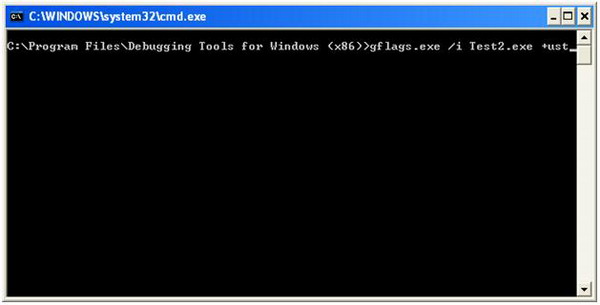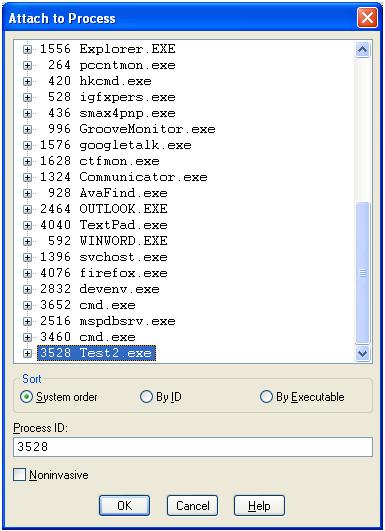Introduction
Memory leak is a time consuming bug often created by C++ developers. Detection of memory leaks is often tedious. Things get worst if the code is not written by you, or if the code base is quite huge.
Though there are tools available in the market that will help you in memory leak detection, most of these tools are not free. I found Windbg as a freeware powerful tool to solve memory leak bugs. At least, we get an idea about the code location which might be suspected to cause memory leaks. COM Interface leaks are out of the scope of this article.
Windbg is a powerful user/kernel space debugger from Microsoft, which can be downloaded and installed from here.
Using Windbg
To start working with Windbg:
- Configure the symbol file path to the Microsoft symbol server “SRV*d:\symbols*http://msdl.microsoft.com/download/symbols”.
- Add your program EXE/DLL PDB (program database) path to the symbol file path.
- You also need to to configure the Operating System's flag to enable user stack trace for the process which has memory leaks. This is simple, and can be done with gflags.exe. Gflags.exe is installed during Windbg's installation. This can also be done through command line, using the command “gflags.exe /i MemoryLeak.exe +ust”. My program name is Test2.exe; hence, for the demo, I will be using Test2.exe rather than MemoryLeak.exe. The snapshot below shows the setting of OS flags for the application Test2.exe.

Once we have configured Windbg for the symbol file path, start the process which is leaking memory, and attach Windbg to it. The Attach option in Windbg is available under the File menu, or can be launched using the F6 shortcut. The snapshot below shows the same:

The !heap command of Windbg is used to display heaps. !heap is well documented in the Windbg help.
I have developed a small program which leaks memory, and will demonstrate further using the same.
 Collapse
Collapse |
Copy Codeint _tmain(int argc, _TCHAR* argv[]) { while(1) { AllocateMemory(); } return 0; } void AllocateMemory() { int* a = new int[2000]; ZeroMemory(a, 8000); Sleep(1); } The above program leaks an integer array of size 2000*4 bytes.
After attaching Windbg to the process, execute the !heap –s command. -s stands for summary. Below is the output of the !heap -s for the leaking process:
 Collapse
Collapse |
Copy Code0:001> !heap -s NtGlobalFlag enables following debugging aids for new heaps: validate parameters stack back traces Heap Flags Reserv Commit Virt Free List UCR Virt Lock Fast (k) (k) (k) (k) length blocks cont. heap ----------------------------------------------------------------------------- 00150000 58000062 1024 12 12 1 1 1 0 0 L 00250000 58001062 64 24 24 15 1 1 0 0 L 00260000 58008060 64 12 12 10 1 1 0 0 00330000 58001062 64576 47404 47404 13 4 1 0 0 -----------------------------------------------------------------------------
Let the process execute for some time, and then re-break in to the process, and execute !heap -s again. Shown below is the output of the command:
 Collapse
Collapse |
Copy Code0:001> !heap -s NtGlobalFlag enables following debugging aids for new heaps: validate parameters stack back traces Heap Flags Reserv Commit Virt Free List UCR Virt Lock Fast (k) (k) (k) (k) length blocks cont. heap ----------------------------------------------------------------------------- 00150000 58000062 1024 12 12 1 1 1 0 0 L 00250000 58001062 64 24 24 15 1 1 0 0 L 00260000 58008060 64 12 12 10 1 1 0 0 00330000 58001062 261184 239484 239484 14 4 1 0 0 -----------------------------------------------------------------------------
Lines marked in bold show the growing heap. The above snapshot shows a heap with the handle 00330000 growing.
Execute “!heap -stat –h 00330000” for the growing heap. This command shows the heap statistics for the growing heap. Shown below is the command's output.
 Collapse
Collapse |
Copy Code0:001> !heap -stat -h 00330000 heap @ 00330000 group-by: TOTSIZE max-display: 20 size #blocks total ( %) (percent of total busy bytes) 1f64 76c6 - e905f58 (99.99) 1800 1 - 1800 (0.00) 824 2 - 1048 (0.00) 238 2 - 470 (0.00) 244 1 - 244 (0.00) 4c 5 - 17c (0.00) b0 2 - 160 (0.00) 86 2 - 10c (0.00) 50 3 - f0 (0.00) 74 2 - e8 (0.00) 38 4 - e0 (0.00) 48 3 - d8 (0.00) c4 1 - c4 (0.00) 62 2 - c4 (0.00) be 1 - be (0.00) b8 1 - b8 (0.00) ae 1 - ae (0.00) ac 1 - ac (0.00) 55 2 - aa (0.00) a4 1 - a4 (0.00)
The above snapshot shows 0x76c6 blocks of size 1f64 being allocated (marked in bold). Such a huge number of blocks of the same size makes us suspect that these can be leaked blocks. Rest of the block allocations do not have growing block numbers.
The next step is to get the address of these blocks. Use the command !heap -flt s 1f64. This command filters all other blocks of heap and displays the details of blocks having size 1f64.
Shown below is the output for the command:
 Collapse
Collapse |
Copy Code0:001> !heap -flt s 1f64 _HEAP @ 150000 _HEAP @ 250000 _HEAP @ 260000 _HEAP @ 330000 HEAP_ENTRY Size Prev Flags UserPtr UserSize - state 003360e0 03f0 0000 [07] 003360e8 01f64 - (busy) 00338060 03f0 03f0 [07] 00338068 01f64 - (busy) 00339fe0 03f0 03f0 [07] 00339fe8 01f64 - (busy) 0033bf60 03f0 03f0 [07] 0033bf68 01f64 - (busy) 0033dee0 03f0 03f0 [07] 0033dee8 01f64 - (busy) 01420040 03f0 03f0 [07] 01420048 01f64 - (busy) 01421fc0 03f0 03f0 [07] 01421fc8 01f64 - (busy) 01423f40 03f0 03f0 [07] 01423f48 01f64 - (busy) 01425ec0 03f0 03f0 [07] 01425ec8 01f64 - (busy) 01427e40 03f0 03f0 [07] 01427e48 01f64 - (busy) 01429dc0 03f0 03f0 [07] 01429dc8 01f64 - (busy) 0142bd40 03f0 03f0 [07] 0142bd48 01f64 - (busy) 0142dcc0 03f0 03f0 [07] 0142dcc8 01f64 - (busy) 0142fc40 03f0 03f0 [07] 0142fc48 01f64 - (busy) 01431bc0 03f0 03f0 [07] 01431bc8 01f64 - (busy) 01433b40 03f0 03f0 [07] 01433b48 01f64 - (busy) 01435ac0 03f0 03f0 [07] 01435ac8 01f64 - (busy) 01437a40 03f0 03f0 [07] 01437a48 01f64 - (busy) 014399c0 03f0 03f0 [07] 014399c8 01f64 - (busy) 0143b940 03f0 03f0 [07] 0143b948 01f64 - (busy) 0143d8c0 03f0 03f0 [07] 0143d8c8 01f64 - (busy) 0143f840 03f0 03f0 [07] 0143f848 01f64 - (busy) 014417c0 03f0 03f0 [07] 014417c8 01f64 - (busy) 01443740 03f0 03f0 [07] 01443748 01f64 - (busy) 014456c0 03f0 03f0 [07] 014456c8 01f64 - (busy) 01447640 03f0 03f0 [07] 01447648 01f64 - (busy) 014495c0 03f0 03f0 [07] 014495c8 01f64 - (busy) 0144b540 03f0 03f0 [07] 0144b548 01f64 - (busy) 0144d4c0 03f0 03f0 [07] 0144d4c8 01f64 - (busy) 0144f440 03f0 03f0 [07] 0144f448 01f64 - (busy) 014513c0 03f0 03f0 [07] 014513c8 01f64 - (busy) 01453340 03f0 03f0 [07] 01453348 01f64 - (busy) 014552c0 03f0 03f0 [07] 014552c8 01f64 - (busy) 01457240 03f0 03f0 [07] 01457248 01f64 - (busy) 014591c0 03f0 03f0 [07] 014591c8 01f64 - (busy) 0145b140 03f0 03f0 [07] 0145b148 01f64 - (busy) 0145d0c0 03f0 03f0 [07] 0145d0c8 01f64 - (busy) 0145f040 03f0 03f0 [07] 0145f048 01f64 - (busy) 01460fc0 03f0 03f0 [07] 01460fc8 01f64 - (busy) 01462f40 03f0 03f0 [07] 01462f48 01f64 - (busy) 01464ec0 03f0 03f0 [07] 01464ec8 01f64 - (busy) 01466e40 03f0 03f0 [07] 01466e48 01f64 - (busy) 01468dc0 03f0 03f0 [07] 01468dc8 01f64 - (busy)
Use any UsrPtr column value from the listed output, and then use the the command !heap -p -a UsrPtr to display the call stack for UsrPtr. I have selected 0143d8c8 marked in bold.
Upon execution of !heap -p -a 0143d8c8, we get the call stack shown below:
 Collapse
Collapse |
Copy Code0:001> !heap -p -a 0143d8c8 address 0143d8c8 found in _HEAP @ 330000 HEAP_ENTRY Size Prev Flags UserPtr UserSize - state 0143d8c0 03f0 0000 [07] 0143d8c8 01f64 - (busy) Trace: 0025 7c96d6dc ntdll!RtlDebugAllocateHeap+0x000000e1 7c949d18 ntdll!RtlAllocateHeapSlowly+0x00000044 7c91b298 ntdll!RtlAllocateHeap+0x00000e64 102c103e MSVCR90D!_heap_alloc_base+0x0000005e 102cfd76 MSVCR90D!_heap_alloc_dbg_impl+0x000001f6 102cfb2f MSVCR90D!_nh_malloc_dbg_impl+0x0000001f 102cfadc MSVCR90D!_nh_malloc_dbg+0x0000002c 102db25b MSVCR90D!malloc+0x0000001b 102bd691 MSVCR90D!operator new+0x00000011 102bd71f MSVCR90D!operator new[]+0x0000000f 4113d8 Test2!AllocateMemory+0x00000028 41145c Test2!wmain+0x0000002c 411a08 Test2!__tmainCRTStartup+0x000001a8 41184f Test2!wmainCRTStartup+0x0000000f 7c816fd7 kernel32!BaseProcessStart+0x00000023
The lines marked in bold shows the functions from our code.
Note: Sometimes, it might happen that the “!heap -s” command does not show a growing heap. In that case, use the “!heap -stat -h” command to list all the heaps with their sizes and number of blocks. Spot the growing number of blocks, and then use the “!heap –flt s SIZE” (SIZE = the size of the suspected block) command.